|
|
|
Sort Order |
|
|
|
Items / Page
|
|
|
|
|
|
|
| Srl | Item |
| 1 |
ID:
066914
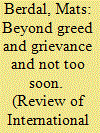

|
|
|
| 2 |
ID:
158004
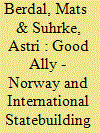

|
|
|
|
|
| Summary/Abstract |
The article examines the findings of the Commission of Inquiry established by the Norwegian government in 2014 to evaluate all aspects of Norway’s civilian and military contribution to the international operation in Afghanistan from 2001 to 2014. Concerned with the wider implications of the Commission’s findings, it focuses on two issues in particular: (1) Norway’s relations with the US, a close and long-standing strategic ally whose resources, capabilities and dominance of decision-making dwarfed that of all other coalition partners in Afghanistan; and (2) Norway’s record in the province of Faryab, where, from 2005 to 2012, a Norwegian-led Provincial Reconstruction Team was charged with bringing security, good governance and development to the province. How Norway prioritised and managed relations with the US highlights and helps to problematise the challenges – political, practical and moral – facing small and medium-sized powers operating in a coalition alongside the US. Norwegian efforts in Faryab are revealing of the dilemmas and contradictions that plagued and, ultimately, fatally undermined the international intervention as a whole. As such, Norway’s experience provides a microcosm through which the inherent limitations of the attempt to transfer the structures of modern statehood and Western democracy to Afghanistan can be better understood.
|
|
|
|
|
|
|
|
|
|
|
|
|
|
|
|
| 3 |
ID:
181189
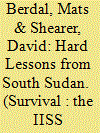

|
|
|
|
|
| Summary/Abstract |
South Sudan's tragic history of independent statehood raises important questions about the future of the United Nations Mission in South Sudan (UNMISS). UNMISS cannot bring peace to the country on its own. For that to happen, South Sudan's militarised form of governance and political economy must be transformed. Recognising UNMISS's limitations does not, however, preclude a vital and continuing role for the mission. UNMISS must work to reduce alarming levels of local and sub-national violence and help shore up the fragile peace agreement reached between Salva Kiir and Riek Machar in 2018. The mission must also manage the risks of further instability posed by poorly managed security-sector reform and elections scheduled for 2022. Finally, UNMISS and the UN must intensify the search for political avenues out of violence. To this end, renewed and constructive international engagement must be marshalled, and the UN must absorb important lessons from its own performance.
|
|
|
|
|
|
|
|
|
|
|
|
|
|
|
|
| 4 |
ID:
057478
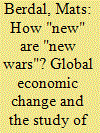

|
|
|
| 5 |
ID:
124439
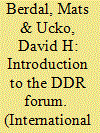

|
|
|
|
|
| Publication |
2013.
|
| Summary/Abstract |
Over the past two decades, international efforts to support the socio-economic adjustment of ex-combatants to the uncertain and often messy realities of postwar situations, have presented donor countries, NGOs and international organizations with complex, often formidable, institutional and logistical challenges. Many of these have been exhaustively and often expertly covered in the still burgeoning literature on disarmament, demobilization and reintegration (DDR). While they continue to merit scholarly and policy attention, the underlying focus of this special issue of International Peacekeeping is less on what we in the past have referred to as the mechanics of DDR - that is, how best to plan, organize, coordinate and fund DDR activities - than on the context and politics of reintegrating ex-combatants following protracted periods of armed conflict and civil war.
|
|
|
|
|
|
|
|
|
|
|
|
|
|
|
|
| 6 |
ID:
091619
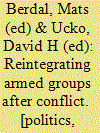

|
|
|
|
|
| Publication |
Milton Park, Routledge, 2009.
|
| Description |
xiv, 226 p. : ill.Hardbound
|
| Contents |
Includes bibliographical references and index.
|
| Standard Number |
9780415476652
|
|
|
|
|
|
|
|
|
|
|
|
Copies: C:1/I:0,R:0,Q:0
Circulation
| Accession# | Call# | Current Location | Status | Policy | Location |
| 054520 | 327.172/BER 054520 | Main | On Shelf | General | |
|
|
|
|
| 7 |
ID:
160029
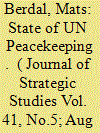

|
|
|
|
|
| Summary/Abstract |
The article considers the state of UN peacekeeping through the prism of its long-running operation in the Democratic Republic of the Congo (DRC). Focusing in particular on the challenges raised by use of force and the protection of civilians in conditions of ongoing armed conflict, it argues that UN field operations must be aligned much more closely than they have been over the past 15 years to political and diplomatic efforts aimed at securing viable political settlements to internal conflict. The issues raised by the history of the UN’s troubled mission in the DRC are deeply relevant to the wider discussion of the organisation’s role in the field of peace and security.
|
|
|
|
|
|
|
|
|
|
|
|
|
|
|
|
| 8 |
ID:
081805
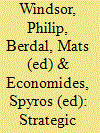

|
|
|
|
|
| Publication |
New Delhi, Viva Books Pvt Ltd, 2006.
|
| Description |
xi, 199p.
|
| Series |
IISS studies in international security
|
| Standard Number |
9788130900858
|
|
|
|
|
|
|
|
|
|
|
|
Copies: C:1/I:0,R:0,Q:0
Circulation
| Accession# | Call# | Current Location | Status | Policy | Location |
| 053485 | 355.0217/WIN 053485 | Main | On Shelf | General | |
|
|
|
|
| 9 |
ID:
053729
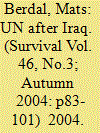

|
|
|
|
|
| Publication |
2004.
|
| Description |
p83-101
|
| Summary/Abstract |
The argument, widely made in the run-up to the war in Iraq, that the UN was on the verge of permanent marginalisation in the field of peace and security has turned out to be misplaced. The clearest sign of revitalisation has come not from its role in post-war Iraq but from the dramatic growth of UN peace operations in Africa since May 2003. While prophecies of doom may have been confounded, there is, within the Secretariat and among member states, still a deep sense that the war in Iraq ‘brought to the fore a host of questions of principle and practice’, whose implications have yet to be addressed. To do this, the Secretary General has set up a High-Level Panel on Threats, Challenges and Change, and indicated that ‘far-reaching institutional’ reform should be on the Panel's agenda. While references to institutional issues are politically unavoidable, the long-term value of the Panel's work will lie, more subtly, in its contribution to the quality of the discussion among member states about the threats and challenges facing them, not in proposals for radical Charter reform.
|
|
|
|
|
|
|
|
|
|
|
|
|
|
|
|
| 10 |
ID:
055483
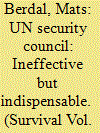

|
|
|
|
|
| Publication |
2003.
|
| Description |
p7-30
|
|
|
|
|
|
|
|
|
|
|
|
|
|
|
|
| 11 |
ID:
134387
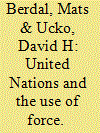

|
|
|
|
|
| Summary/Abstract |
When, in An Agenda for Peace of June 1992, Boutros Boutros-Ghali set
out his vision for a revitalised UN after the Cold War, he offered a
definition of UN ‘peacekeeping’ in which the insertion of one innocentsounding
word appeared to herald a new era. ‘Peace-keeping’, the UN
secretary general probingly stated, ‘is the deployment of a UN presence
in the field, hitherto with the consent of all the parties concerned’.
Catching the attention of UN officials, academics and governments at
the time, the reference to ‘hitherto’ was deemed highly significant. It
seemed to imply that the tried and tested principles of UN peacekeeping
– its reliance on the principles of consent, impartiality and minimum use
of force except in self-defence – might now, in the post-Cold War era,
give way to a more expansive role for UN military forces, one that
would likely involve taking the initiative in the use of force.
|
|
|
|
|
|
|
|
|
|
|
|
|
|
|
|
| 12 |
ID:
060865
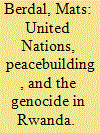

|
|
|
|
|
| Publication |
Jan-Mar 2005.
|
|
|
|
|
|
|
|
|
|
|
|
|
|
|
|
| 13 |
ID:
064668
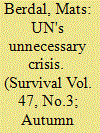

|
|
|
|
|
| Publication |
Autumn 2005.
|
| Description |
p7-32
|
|
|
|
|
|
|
|
|
|
|
|
|
|
|
|
| 14 |
ID:
138429
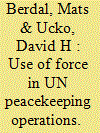

|
|
|
|
|
| Summary/Abstract |
Although the demand for UN peacekeepers shows little sign of abating, a sense of uncertainty and malaise continues to colour discussions about the future of UN peacekeeping. Of the many issues facing the UN High-Level Independent Panel on Peace Operations that was set up in 2014, the use of force by UN peacekeepers is likely to attract particular attention. It is also likely to prove divisive, both among member states and within the Secretariat. While steps can be taken to strengthen the capacity of the UN to mount and conduct field operations, Mats Berdal and David H Ucko argue that the way forward does not lie simply in entrusting UN forces with ever-more ‘robust’ war-fighting mandates. Instead, more systematic attention needs to be given to strategically linking UN peacekeeping activities to political processes aimed at bringing violent conflict to an end. This will require far greater honesty from member states regarding their own responsibility in enabling the UN to do what they ask of it.
|
|
|
|
|
|
|
|
|
|
|
|
|
|
|
|
| 15 |
ID:
176523
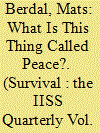

|
|
|
|
|
| Summary/Abstract |
Three books on peacekeeping explore the elusiveness and complexity, but also the feasibility, of UN-facilitated peace.
|
|
|
|
|
|
|
|
|
|
|
|
|
|
|
|
|
|
|
|
|